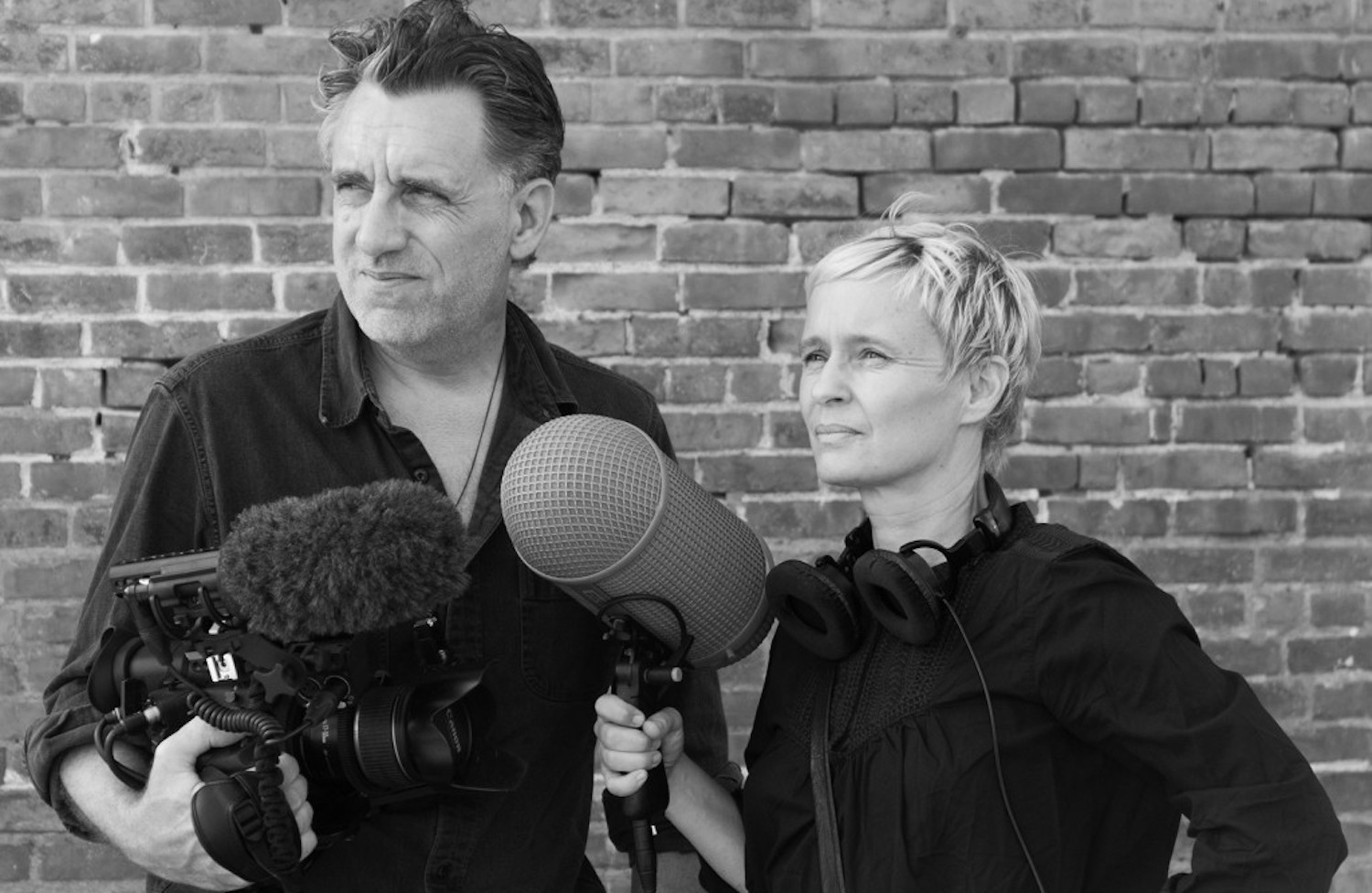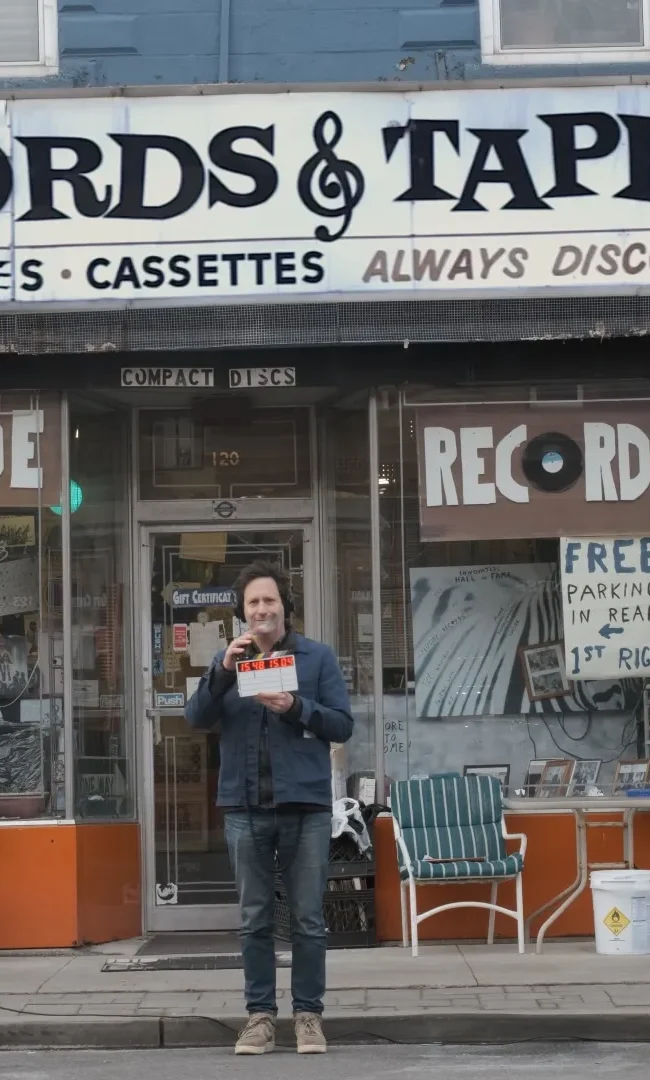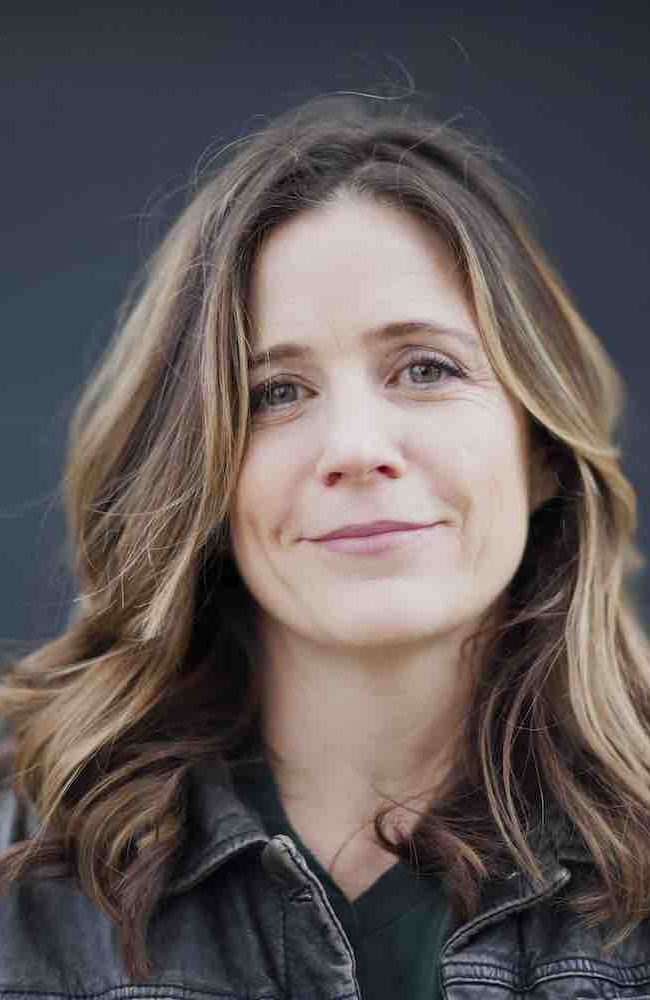A Conversation with Petra Epperlein & Michael Tucker (THE MEANING OF HITLER)

I watched and reviewed directors Petra Epperlein and Michael Tucker’s fascinating and surprisingly playful documentary The Meaning of Hitler at the 2020 DOC NYC Film Festival. Taking its title from Sebastian Haffner’s eponymous 1978 book, the film explores the legacy of fascism and Hitler in today’s world, both in Europe and the United States. No matter the seriousness of the subject, Epperlein and Tucker take us on a journey where the bad news comes at us via jaunty mise-en-scène. It’s depressingly good fun, and IFC Films releases it on August 13, in both theaters and on demand. Here is a condensed digest of our recent Zoomconversation, edited for length and clarity.
Hammer to Nail: You two are not only creative, but also romantic life partners. How did you meet? And when did you decide that working together would be a good thing?
Michael Tucker: We met on the streets of New York City in…
Petra Epperlein: …1994.
MT: And then we, shortly thereafter…
PE: …we started working together pretty much immediately. That’s kind of the story.
HtN: And it’s obviously been fruitful.
MT: Not many people can do it, but somehow, we figured it out.
PE: We have made many movies, and we have a daughter. (laughs)
HtN: Wonderful! So, how do you divide the labor? Does one of you do more of one thing, and the other more of another? How does that work?
MT: I’m always shooting.
PE: I always do sound.
MT: That’s in the field. Both of us produce, though you [to Petra] probably produce more.
PE: Right.
MT: Then we typically sit down together and go through the paper edit, and then I do the physical editing. I usually do that at night. I wake up in the morning, and then we sit there with coffee, and then she tells me what’s wrong. (laughs)
HtN: That sounds like a wonderful partnership. Since you’ve been doing this since 1994, and probably before that, have you always used the same editing software?
MT: I’ve been doing it for 30 years, and when I started, it was tape-to-tape. My first camera was actually VHS. Then I stepped up to S-VHS. Then it was Hi-8, which was, “Wow.” Then, of course, DV was really the thing that changed everything. And I would say that it’s the first version of Final Cut that was the revolution. In fact, we were just talking to someone the other day about the first wave of 9/11 films. When you think about how incredible it was that you could have a camera, have a bunch of boxes of tape, and you could get in a car, and you could drive to Baghdad. You could film a war, and you didn’t need anybody. It was amazing! I think people have forgotten just what a shift that was, that suddenly, anybody can make a movie.
HtN: Do you still use Final Cut Pro? Or did you abandon that, as so many did when Apple switched to FCPX, to move on to something else, like Premiere or Avid?
MT: Unfortunately, my trusty, what version was that? It was Final Cut …
HtN: It was Final Cut 7 before they then switched to X.
MT: Yeah. I mean, probably the last film we cut on that was in 2013. Then we switched to Premiere, which is still imperfect, and buggy and slow. But I mean, man, it’s so funny now…we’re living in Berlin [Germany] now, and I’ll just ride around with a camera in my messenger bag and I’m like, “I’m making a movie.” I don’t know what you’re doing, but… (laughs)
HtN: So, tell me about Sebastian Haffner’s 1978 book, The Meaning of Hitler. Why did you choose that as the inspiration for the movie? How did you get from that to saying, “We’re going to make this movie, using its title?”
PE: When Haffner wrote the book, and when it was released, that was during the so-called “Hitler Wave,” when Hitler first became some kind of pop-cultural icon, and many, many books were written and published back then, and they mostly were concerned with Hitler’s biography, and Haffner’s book was different. He was not interested in Hitler, the man; he didn’t think we would learn anything from him. He was interested in what actually happened, what he did. So, he wrote this really slim book, The Meaning of Hitler, and it’s just fascinating.
MT: I mean, he just kind of went after the Hitler cult. He just tore it down, and don’t forget, he came of age as Hitler was coming to power. Then he left for the UK, with his fiancée, who was Jewish. And he held a grudge his entire life about what Hitler did to Germany, and also what Germans allowed to happen in Germany. Because he left, he also had an entirely different viewpoint. There were a lot of people, over the years, who tried to defend the German people, and there were a lot of excuses made.

White nationalists participate in a torch-lit march on the grounds of the University of Virginia ahead of the Unite the Right Rally in Charlottesville, Virginia on August 11, 2017. Picture taken August 11, 2017. REUTERS/Stephanie Keith
HtN: Yeah. We’ll see what happens in the history of the United States, 20-30 years from now, if we’ll be doing the same. So, when did you actually start making this film? Obviously, it’s clear in 2021 how much fascism is resurgent in our world and it has been for some time, but was it so clear when you started making your movie?
MT: No. When it started, it was right after Charlottesville. Obviously, people always like to compare things, and Nazism comes up, Hitler comes up, all the comparisons come up. Of course, it was this very real, violent manifestation of this ideology in America, although there was plenty of that here in Europe. Then we decided to hit the road.
PE: Right. But we were inspired already to start thinking about it earlier. When we were filming our previous film here in Germany, we encountered these huge new right-wing movements, protesting the immigration politics of the government. So, we filmed, by night, 30,000 people with torches, chanting stuff like “Lying press, Lügenpresse,” which is a word directly from Hitler’s playbook, from the ’30s. That was very concerning. I grew up in East Germany, and when the Berlin Wall fell, you probably remember that in ’89, history was declared to be over.
HtN: Yes, and Francis Fukuyama even wrote a book, The End of History.
PE: Yes.
HtN: Your film is actually very playful, visually and otherwise. How did you decide on such an approach for such a serious topic?
MT: A lot of our work is that way. It goes against this doctrine in American documentary that is actually pretty straight, at least most of what you see. So we’re always walking a fine line there. But with this subject, it was interesting, sitting down with these older historians, like Yehuda Bauer or Saul Friedländer. I mean, they have spent their entire adult life studying this, but they just also have great senses of humor. There’s a moment where Friedländer’s just saying, looking at us, going, “Well, good luck making this film,” that could be kind of setting us off on that. It’s sort of a preposterous notion to even attempt to do this, starting as a farce. The film premiered at DOC NYC in November, which was the week after the election, and we’ve come a long way from that, where you feel like this whole discourse is very, very different now.
PE: Also, we want an audience, right? I mean, there are plenty of films about serious subject matters which no one watches, because they’re a little bit too dry, so …
HtN: Sure, you’re not remaking The Sorrow and the Pity. I mean, I appreciated your approach. I was just curious how you came to it. So, you have so many wonderful interview subjects. What was your process like in recruiting these people to be on camera?
PE: Well, some of the older ones, of course, they are just the most important living experts on the subject matter. So we went after them, and we were very lucky that they agreed to work with us, basically.
MT: There’s a pretty stellar list in there, but there are also some people that we didn’t go to, which was also deliberate, because, I don’t know, there were certain ways of looking at it that we wanted to stay away from. The obvious one is, we’re not living in the 1930s: Trump is not Hitler. I mean, certainly, you can look at things that are similar, but we didn’t want this to be a one-for-one, “the past is living in the present” sort of thing. We wanted a more nuanced look. I think there’s something for everyone.
HtN: Did you experience, for whatever reason, any cases where people that you approached declined to be part of the film? Or was everyone pretty much on board, like, “This is a great idea, yes, let’s do it”?
PE: There were only two, and we interviewed, actually, many more people who didn’t ultimately make it into the film.
HtN: What about David Irving? I mean, obviously he’s very confident in his horrific views, so maybe he’s happy to be on camera no matter who’s making the film. But did you have any challenges getting him to agree to be in the movie?
PE: No, he responded immediately. He is really hungry for the camera. He agreed right away.
MT: He’s someone you have to be extremely careful with, though, because he is just a camera magnet, and he is extremely…I wouldn’t call him charming, but I would say that he gets into this thing where he’s like documentary gold, and you could just follow him forever and do this. And people would see selects, and go, “Oh, my God, you should make a film about David Irving.” Well, no, you shouldn’t make a film about David Irving, because he’s just so toxic.
On the one hand, he’s self-aware, and on the other hand, he’s not. I mean, we only decided to include him because of, I mean, people don’t really understand how anti-Semitism and Holocaust denial are coming from the same place. When people like Mark Zuckerberg – you saw the part in the film with him – are like, “Well, sometimes people get things wrong. That’s why we allow disinformation on our platform.” It’s like, “Well, they don’t get things wrong. They deliberately post things that are lies, to hurt people.”

A still from “the Meaning of Hitler”
PE: We thought it was pretty outrageous that Irving was actually able to do these tours he did in Poland, totally unchallenged. He just goes there with his fans and walks around, and talks about his extremely twisted version of history, and nobody challenges him. While in other countries, he’s not even allowed to enter, like, he can’t go to Germany or Austria or Australia. So yeah, that’s disturbing.
HtN: Of course, Poland has its own issues right now, with a rising right wing, unfortunately. So, as you mentioned, this premiered at DOC NYC in 2020, which is where I saw it. How would you say that the world has changed since its premiere? You talked about the election, but you’re taking a more global view than just in the United States. Have you seen increasing trends in certain directions since you completed the movie?
MT: Well, I mean, it’s interesting. I voted in the US election and we left America that weekend. The next week was DOC NYC. We were in Berlin for, I don’t know, God knows whatever, six weeks or something. And then January 6th happened. It’s funny, when you look at the full range of, as we were finishing this film, I mean…both the Trump years, and then George Floyd, and then the pandemic, and this rising political violence…it’s pretty traumatic.
PE: And it seems to get crazier and crazier, actually, every day, pretty much everywhere.
HtN: Sure. Isn’t that, in fact, “the meaning of Hitler,” in that these lessons cannot be ignored, because history and humanity will repeat itself in different ways? That’s how I see it, at least. So, final question: when you were in Fort Belvoir, Virginia, the Raiders of the Lost Ark place, as it’s called, were you able to track down the ark and look at it without your faces melting off? And if so, how?
MT: (laughs) We would have to kill you if we told you, so…
HtN: (laughs) I love that location, by the way. It’s such a great location.
MT: A crazy, nuts place, and it’s one of those “only in America” kinds of places. I mean, there’s probably some place like that in Germany, but it’s like, you probably have to be part of a, I don’t know…
PE: No, there were too many wars in between, and people took things away, and all of it is now sitting in Fort Belvoir.
MT: That’s possible.
HtN: I certainly hope I one day get a chance to see it! Well, thank you both, Michael and Petra. It was wonderful talking to you, and thank you for making the film.
PE/MT: Thanks for having us!
– Christopher Llewellyn Reed (@ChrisReedFilm)











